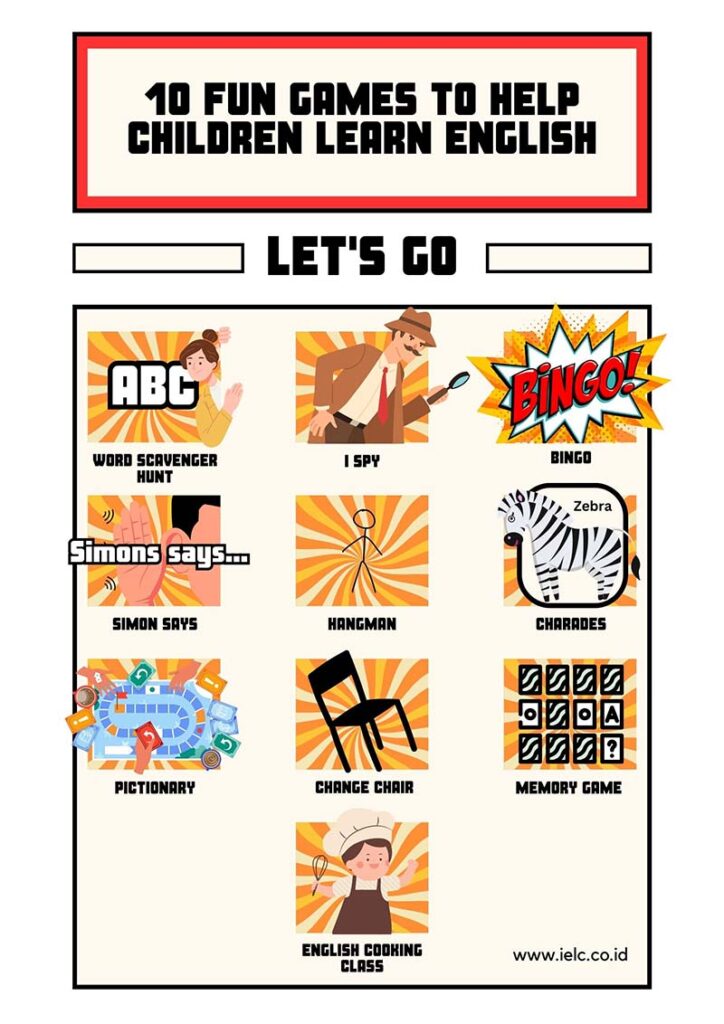
10 fun games to help children learn English
Hello to all the amazing parents and teachers out there!
You’ve clicked here because you’re on a mission – to add a dash of excitement to your children’s English learning journey, am I right?
Hats off to you for taking the lead! English fluency is a powerful tool for their future, and you’re crafting the path brilliantly!
But who said that the road to mastery needs to be all work and no play? In our playbook, fun and learning go hand in hand!
Here’s something you probably remember from your own childhood – the joy of playing games. The laughter, the friendly competition, the triumphant feeling when you won, and the lessons learned when you didn’t. Guess what? We’re bringing that back, but with a twist!
How about transforming your favorite games into engaging English language learning tools?
Surprised?
Don’t be! Traditional games like bingo and charades can be excellent platforms for boosting English skills. They promote conversational practice, vocabulary enhancement, and even confidence in public speaking.
And let’s not forget…
The thrill of the game, the camaraderie, the unexpected twists and turns…
That’s our secret recipe for an engaging learning experience!
Ready to learn more? Let’s dive right in…

1. Word scavenger hunt (Age: 5+)
Buckle up, parents! It’s time to bring some adventure into your home with the Word Scavenger Hunt!
Now, before you worry about turning your house upside down, let’s set the record straight: This is no ordinary scavenger hunt. It’s a playful twist designed to power up your kids’ English language skills. And yes, you get to keep your house intact!
Here’s how it works:
- Begin by creating a list of words, each representing an object around the house. Depending on your children’s age and proficiency level, these can range from simple words like “cup,” “pen,” or “book,” to more complex ones like “spatula,” “potted plant,” or “toothbrush.”
- Once you have your list ready, let the hunt begin!
- The mission? Your children need to find these objects and, here’s the catch, they must spell the word correctly.
- But wait, there’s more! Once they find the object, they need to use it in a sentence. For instance, if the word is “cup,” they could say, “I drink water from this cup every day.”
Now, that’s a triple threat – reading, spelling, and constructing sentences all in one game!
It’s the perfect recipe for a day of learning and fun. Plus, it encourages curiosity and observation skills.
Ready to try out the Word Scavenger Hunt with your little language learners? You’re in for an exciting day, filled with discoveries and, most importantly, tons of English practice!
2. I spy (Age: 3+)
The brilliance of “I Spy” is its simplicity – all you need are your eyes, some objects around you, and your English vocabulary!
Here’s how to play:
- One person, the spy, starts by picking an object in the room without telling anyone what it is. The spy then says, “I spy with my little eye something that is…”, and completes the sentence with a descriptive word or color related to the object. For example, “I spy with my little eye something that is red.”
- Now the hunt is on! The other players take turns guessing what the object could be based on the description given. “Is it the red apple on the table?” “Is it the fire truck toy?”
Why is this game great for English learning?
Not only does it teach your children to listen carefully and follow instructions, but it also enhances their vocabulary. They learn to describe objects using different adjectives, colors, and sizes, all while having a blast!
Plus, it’s a wonderful way to practice speaking and listening in English, which are crucial components of language learning.
Excited to play “I Spy” with your kiddos? It’s a magical journey filled with discovery and language learning, all rolled into one!
3. Bingo (Age: 4+)
Who doesn’t love a good game of Bingo? The thrill of the game, the anticipation, the absolute joy when you finally shout “Bingo!” – it’s a game that never gets old!
First, let’s talk about setup:
- Instead of using the traditional numbered bingo cards, we’re going to create our own version of English Learning Bingo cards. These could feature pictures, words, phrases, or even English letters, depending on your child’s proficiency level.
- During the game, instead of simply calling out the numbers, describe the items on the card. For instance, if your card features a picture of an apple, you could say, “I’m looking for a red fruit that’s crunchy and delicious!”
- Your children then have to match the description to the right picture on their Bingo card.
This game works wonders for vocabulary building and listening comprehension. Not to mention, it gives them an opportunity to learn and use new adjectives and descriptive phrases.
4. Simon says (Age: 3+)
If you’re looking for a game that combines physical activity with English language practice, look no further! “Simon Says” is a classic game that we’re sure will bring plenty of giggles and excitement into your household.
How does “Simon Says” help with English learning? Well, it’s all about listening comprehension and following instructions.
Here’s how it works:
- One person plays “Simon” and gives commands starting with “Simon says,” such as, “Simon says touch your nose,” or “Simon says hop on one foot.” The others must follow the command only when it starts with “Simon says.” If Simon gives a command without saying “Simon says” first, and someone follows the command, they’re out!
- By playing “Simon Says,” your children get to learn new verbs and body parts in English. Plus, it’s a great opportunity for them to practice listening carefully and following instructions – all in English!
And here’s the icing on the cake…
The active element of the game ensures your kids stay energized and engaged. Plus, it’s a game that’ll have everyone laughing and enjoying their time together. Learning English doesn’t get more fun than this!
5. Hangman (Age: 6+)
Time to put on your detective hats, parents and kids! Hangman is here to add an element of mystery and excitement to your English learning journey.
Hangman, if you’ve never played it before, is a simple yet intriguing word game that will get those little gears in your children’s minds turning!
Here’s how it’s played:
One person thinks of a word, phrase, or sentence and draws a line for each letter of the word on a sheet of paper. The other players then guess letters one by one. If the guessed letter is in the word, the player who thought of the word fills in the blanks. If the guessed letter is not in the word, a part of the hangman is drawn. The game continues until the word is guessed correctly, or the hangman is completely drawn.
This game can work wonders for your children’s English vocabulary and spelling skills. It encourages them to recall and spell words correctly. Plus, guessing the words adds an element of suspense and fun that keeps them engaged and motivated!
6. Charades (Age : 6+)
Lights, camera, action! Charades is here to bring the excitement of the stage into your living room, all while supercharging your children’s English learning!
Charades is an absolute classic, loved for its simplicity and the sheer hilarity that usually ensues. But it’s more than just fun – it’s a wonderful way to enhance your children’s English vocabulary and comprehension!
Here’s how you play:
One person acts out a word or phrase without speaking, and the others must guess what it is. The words and phrases can be anything from book or movie titles to everyday items, animals, or actions.
How does this help with English learning, you ask?
First, picking a word or phrase to act out requires your child to dig into their vocabulary bank, which in itself is a fantastic exercise. Then, understanding and guessing the acted-out clues means they’re actively thinking in English – a crucial part of language learning!
And let’s not forget…
The thrill of guessing, the fun of acting, the excitement when the answer is finally revealed…
That’s our recipe for a lively, laughter-filled English learning session!
7. Pictionary (Age: 6+)
Grab those sketchbooks, it’s time for Pictionary! This game merges the fun of drawing with the thrill of guessing. But it doesn’t stop there – it’s also a fabulous tool for enhancing your children’s English skills! If you haven’t played Pictionary before, you’re in for a treat.
Here’s how it works:
One person picks a word or phrase and draws it out on paper, while the others guess what they’re drawing. The key is that the person drawing cannot use any words or letters, only pictures!
But how does this help with English learning?
Well, first off, thinking of a word to draw encourages your children to delve into their English vocabulary. Then, guessing the drawn words or phrases is an exercise in comprehension and word association – both vital for language learning!
And let’s not forget the creativity and fun this game inspires! Your children will be so engaged, they’ll forget they’re learning – and that’s the best kind of learning!
8. Change chair (Age: 4+)
Get ready for some moving and shaking with Change Chair, a dynamic game that’s all about laughter, excitement, and, yes, learning English!
In Change Chair, you set up a circle of chairs, one less than the number of players. Everyone sits on a chair except for one person who stands in the middle. The person in the middle then makes a statement about a certain characteristic, like, “Change chairs if you’re wearing blue!” or, “Change chairs if you love dogs!” Now, everyone for whom that statement applies must stand up and scramble to find a new chair, including the person in the middle. The one left without a chair gets to be the next person to call out a characteristic!
This simple but energetic game encourages children to think in English and practice both speaking and listening skills. The act of forming statements and understanding them in real-time to respond accordingly is invaluable language practice! Plus, the game’s lively nature keeps kids engaged and excited!
9. Memory game (Age: 4+)
Calling all memory masters! The English Memory Game is here to add a splash of fun and a heap of learning to your day.
This game, also known as the “Concentration Game”, combines memory skills with English vocabulary in a truly engaging way!
Here’s how to play:
Lay a set of word cards face down on a table. The words can be anything you want your children to practice – animals, colors, food items, and more! Players take turns flipping two cards at a time. If the cards match, they get to keep them and have another turn. If they don’t match, they turn the cards back over, and it’s the next player’s turn.
What makes the English Memory Game such a fantastic language learning tool?
Your children will need to remember where each card is, but they’ll also need to recall the English words on the cards – a fantastic exercise in English vocabulary recall and reinforcement!
Plus, the suspense of not knowing what’s on each card, the thrill of finding a match, and the friendly competition make this game a guaranteed hit!
Ready to test your memory skills with the English Memory Game? Let’s shuffle those cards!
10. English cooking class (Age: 4+)
Get those aprons ready and roll up your sleeves! English Cooking Class is about to stir up some serious fun in your language learning journey.
Think of your kitchen as an interactive classroom. The recipes become your study material, the ingredients are your vocabulary words, and the finished dish? That’s your successful assignment!
Here’s how you can run your very own English Cooking Class:
Choose a simple, yet delicious recipe that’s written in English. The complexity can depend on your child’s age and proficiency level in English. This could range from making a simple sandwich to baking a batch of scrumptious cookies!
Your little ones can learn and use new vocabulary words such as “stir the batter,” or “chop the vegetables”. As they follow the recipe, encourage them to say the steps out loud in English. This practice not only enhances their English comprehension skills but also helps them remember new words and phrases.
But the learning doesn’t stop there! While cooking, you can also discuss the origin of the dish. For example, if you’re cooking spaghetti, you could talk about how it’s a traditional Italian dish. Or if you’re making tacos, you can chat about Mexican cuisine. This way, your children will learn about different cultures, thereby enriching their general knowledge along with their English.
And the cherry on top?
You get to enjoy a delicious dish at the end of your English lesson! Now that’s what we call a tasty learning experience!
Next steps
Do you want to speak English with confidence?
Most people lack confidence when they speak English. They are afraid to make mistakes and are embarrassed to speak in front of others.
This is because they have been taught English the wrong way!
Most English courses waste your time and money on useless exercises that don’t bring results. Even worse, they teach you bad habits that are very difficult to unlearn.
As a result, you become confused and lack confidence. This is wrong!
At IELC, we teach English the right way
Our goal is to get you speaking in English with fluency and confidence as fast as possible. We want to give you the skills you need to fulfil your potential!
Our experienced teachers will guide you along every step of the learning process to ensure that you are not wasting your time, money, and energy on useless language exercises & wrong methods.
Our courses
With our modern campus and technology, we are equipped to provide the best possible courses for children, teens, and adults, including:
Online and on campus IELTS courses
Online and on campus TOEFL PBT courses
Online and on campus TOEFL iBT courses
We offer our classes in group classes or private classes.
No matter what your goals are, our team will help you achieve these goals by providing you with Indonesia’s best English courses!
Talk to our team today to get your FREE consultation and take your first step towards success.
Sincerely,

IELC Academic Director
